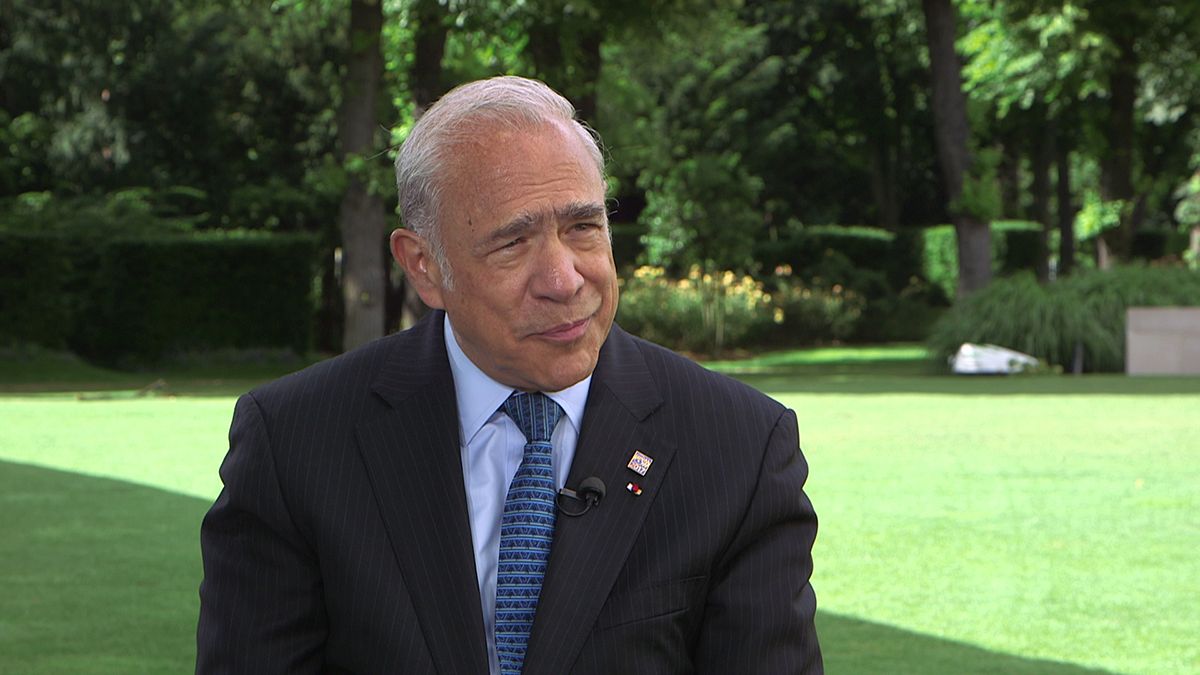Climate change, the US, Brexit and Europe were all up for discussion when euronews interviewed Angel Gurria, Secretary-General of the Organisation for Economic Cooperation and Development…
Climate change, the US, Brexit and Europe were all up for discussion when euronews interviewed Angel Gurria, Secretary-General of the Organisation for Economic Cooperation and Development (OECD).
Oleksandra Vakulina, euronews
“Mr Gurria, a few days ago Donald Trump announced the decision to pull the United States out of the Paris climate change accord. What would be the foreseeable economic impact of this decision?”
Angel Gurria, Secretary-General, OECD
“This is an intra-generational issue. We are convinced that, perhaps, in the United States emissions are going to continue to drop, because already there is a culture, and at the same time because technology is driving renewables to become cheaper than the alternatives of fossil fuels.”
euronews
“Do you think it’s possible that Donald Trump would reconsider this decision?”
Angel Gurria
“We have just issued a very important study called ‘Investing in climate, investing in growth’.”
euronews
“After the decision?”
Angel Gurria
“No, some time before actually. Perhaps not long enough before the decision to have an impact.
“We proved there that it’s good business to be good to the climate and to the environment and to the planet.”
euronews
“President Trump also said that many trade deals will soon be under renegotiation. How will this impact the US’ position in the world and, probably, its global influence?”
Angel Gurria
“I think the fact that you want to have a better deal on trade or on anything is legitimate. And that one should pursue in fact that it’s a part of a duty of leaders to look for a better deal for their countries.
“I think we all support free trade and fair trade, in the sense of no distortions, no hidden subsidies, no protectionism, no fiddling with the currencies etc, we all support those principles.
“But after that, then there are fundamentals of productivity and competitiveness. And you should let those forces express themselves freely.
“For example, you know, I am Mexican citizen. Right now there is a process that is taking off of renegotiating NAFTA. Well, in a way NAFTA had already been renegotiated, because in the TPP already Canada, Mexico and the United States – the three of them – had accepted new, more modern, updated, upgraded rules of the game, if you will!”
euronews
“Let’s now look across the Atlantic. There is another country that will have to renegotiate quite a few deals, the United Kingdom. London seems to be relatively calm when it comes to the post-Brexit future, once it’s done. What’s your take on it?”
Angel Gurria
“Well, first of all, the British are always very calm. Remember, I think it was Winston Churchill, in the middle of the blitz, in the middle of the war, who said “stay calm and carry on”. So they are good at that, they are resilient.
“You are talking now about the modification, I am not going to say ‘Undoing’, because it’s not going to be undone. The modification, the changing of rules after 40 years of integration.
“If we think NAFTA is tightly-knit after 25 years, this is 40 years! And therefore it’s unexpected, shocking, perhaps, for the British as much as for the Europeans. It’s going to be costly.”
euronews
“Do you think it’s going to be more costly for London or for Brussels?”
Angel Gurria
“It doesn’t really matter! It is going to have a cost that was not there, that should not have happened! I think it’s going to be more costly for the British.
“The idea now – it happened. We have to accept the will of the British people and then try to make it as smooth, as seamless as possible.”
euronews
“Do you expect more inequality there, in the United Kingdom?”
Angel Gurria
“I do not expect inequality to be exacerbated because of Brexit. I think inequality has been growing in practically all the countries as a result of the crisis itself. But it was growing before the crisis. This is important to know.”
euronews
“I’ve got the last question. You have been at this position for over 10 years at the OECD . What was it that struck you the most?”
Angel Gurria
“Well, when I ran for the job, I said that I would pay great attention to three things. And those three things were: health, migration and water.
“And I remember that people understood why I was interested in looking at the health, It’s a single fastest growing element in our budgets and it’s growing so fast, that it is going to be like a Pac-man.
“Then I remember that the migration – not a lot people understood why I wanted to talk about it. Some people thought it was because I am Mexican and you know all this migration for Mexico with the United States.
Well, unfortunately, we were proven right, as you can see. And it was not about migration, it was integration, integration, integration…
“And then last but not least, nobody understood why I wanted to talk about water. And now everybody does.
“So these three things struck me.
“But what struck me MORE when I arrived is… You know I had been a participant in a negotiation about free trade with Europe. I knew about the complexities of Europe. I had lived in Europe, I had lived in the UK, I studied here, I travelled extensively throughout Europe.
“But being at the OECD, which was born out of reconstruction of Europe, and looking at all the countries, having them all around with their different characteristics, complexities, problems and challenges etc and admiring the extraordinary construction that is Europe, that is the European Union, the European Commission with all its complexity and difficulties and challenges etc – I think this is something that is admirable.”
